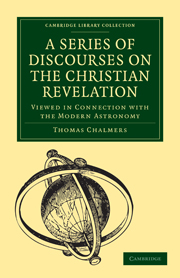Book contents
- Frontmatter
- PREFACE
- Contents
- DISCOURSE I A SKETCH OF THE MODERN ASTRONOMY
- DISCOURSE II THE MODESTY OF TRUE SCIENCE
- DISCOURSE III ON THE EXTENT OF THE DIVINE CONDESCENSION
- DISCOURSE IV ON THE KNOWLEDGE OF MAN'S MORAL HISTORY IN THE DISTANT PLACES OF CREATION
- DISCOURSE V ON THE SYMPATHY THAT IS FELT FOR MAN IN THE DISTANT PLACES OF CREATION
- DISCOURSE VI ON THE CONTEST FOR AN ASCENDENCY OVER MAN, AMONGST THE HIGHER ORDERS OF INTELLIGENCE
- DISCOURSE VII ON THE SLENDER INFLUENCE OF MERE TASTE AND SENSIBILITY, IN MATTERS OF RELIGION
- APPENDIX
DISCOURSE V - ON THE SYMPATHY THAT IS FELT FOR MAN IN THE DISTANT PLACES OF CREATION
Published online by Cambridge University Press: 29 August 2010
- Frontmatter
- PREFACE
- Contents
- DISCOURSE I A SKETCH OF THE MODERN ASTRONOMY
- DISCOURSE II THE MODESTY OF TRUE SCIENCE
- DISCOURSE III ON THE EXTENT OF THE DIVINE CONDESCENSION
- DISCOURSE IV ON THE KNOWLEDGE OF MAN'S MORAL HISTORY IN THE DISTANT PLACES OF CREATION
- DISCOURSE V ON THE SYMPATHY THAT IS FELT FOR MAN IN THE DISTANT PLACES OF CREATION
- DISCOURSE VI ON THE CONTEST FOR AN ASCENDENCY OVER MAN, AMONGST THE HIGHER ORDERS OF INTELLIGENCE
- DISCOURSE VII ON THE SLENDER INFLUENCE OF MERE TASTE AND SENSIBILITY, IN MATTERS OF RELIGION
- APPENDIX
Summary
“I say unto you, that likewise joy shall be in heaven over one sinner that repenteth, more than over ninety and nine just persons which need no repentance.”
Luke xv. 7.I have already attempted at full length to establish the position, that the infidel argument of astronomers goes to expunge a natural perfection from the character of God, even that wondrous property of his, by which he, at the same instant of time, can bend a close and a careful attention on a countless diversity of objects, and diffuse the intimacy of his power and of his presence, from the greatest to the minutest and most insignificant of them all. I also adverted shortly to this other circumstance, that it went to impair a moral attribute of the Deity. It goes to impair the benevolence of his nature. It is saying much for the benevolence of God, to say, that a single world, or a single system, is not enough for it—that it must have the spread of a mightier region, on which it may pour forth a tide of exuberancy throughout all its provinces—that as far as our vision can carry us, it has strewed immensity with the floating receptacles of life, and has stretched over each of them the garniture of such a sky as mantles our own habitation—and that even from distances which are far beyond the reach of human eye, the songs of gratitude and praise may now be arising to the one God, who sits surrounded by the regards of his one great and universal family.
- Type
- Chapter
- Information
- A Series of Discourses on the Christian Revelation, Viewed in Connection with the Modern Astronomy , pp. 160 - 188Publisher: Cambridge University PressPrint publication year: 2009First published in: 1817



